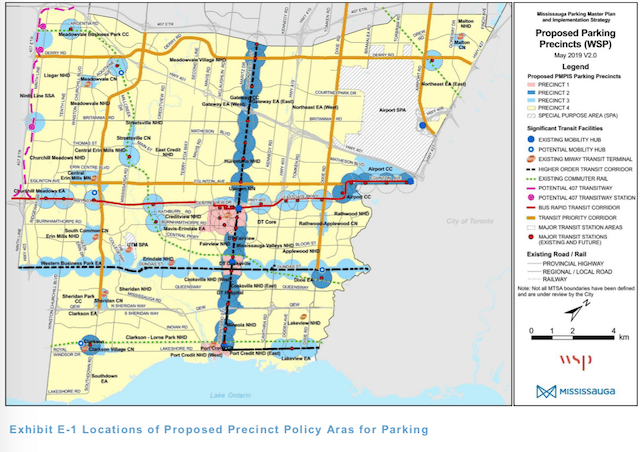City Proposes Major Parking Updates Affecting All Mississauga Drivers
Published June 13, 2019 at 4:35 am

The city is proposing some major changes to parking in the city.
After a two-year study, the city just released the Parking Master Plan and Implementation Strategy, which is the first plan on local parking in the city. They gathered input from decision-makers, parking providers and the public through in-person workshops, one-on-one interviews, a dedicated project website, social media and online surveys.
“Our plan will change behaviour and reduce the use of the car by leveraging innovative technology, data and resources to encourage residents to walk, cycle or take transit to travel across our city. This plan also encourages the private sector to work with the city to ensure we are meeting the demands of business today and in the future,” said Mayor Bonnie Crombie.
The plan recommends that the city works with Metrolinx to develop a strategy to reduce all-day free parking at GO Transit rail and bus stations.
The plan also suggests updating the parking supply requirements under the city’s zoning by-law. The by-law establishes maximum parking requirements, eliminates the requirement for residents to petition for Lower Driveway Boulevard Parking and develops a digital on-street parking permit program. The digital program will be in charge of processing, operating and enforcing the permits.
“During our extensive public consultation process, it was clear that a ‘Made-for-Mississauga’ approach was needed. The Parking Master Plan and Implementation Strategy will meet the parking requirements at the neighbourhood level while providing and managing parking to support Mississauga’s range of transportation options,” said Manager of Municipal Parking Jamie Brown.
The plan first breaks down the city into four precincts, which is shown on the map below:

The goal for precinct one is to lower parking requirements and increase management strategies. For precinct two, the city proposes to have the second lowest parking requirements with a high level of parking management strategies and create scheduled paid parking.
The city is also proposing to add minimum parking requirements for precinct three and reduce parking requirements in the proposed transit areas. They will also lower parking requirements in precinct four, but at a very minimal degree.
The plan states that parking is allowed on city roads for a maximum of five hours unless otherwise posted. Parking on-street is not permitted overnight between 2 a.m and 6 a.m. Vehicles with accessible parking permits can park on-street for a maximum of 24 hours. In certain locations, 15-hour on-street parking is permitted including overnight hours. On statutory holidays, parking is allowed between 8:00 am and midnight without time restriction. The city is currently reviewing the feasibility of removing overnight parking prohibitions.
The city might also work with other cities business units, such as Parks and Forestry and Mississauga Transitway, to expand parking and find opportunities for more public parking spaces.
A pilot project is also underway to test a License Plate Recognition technology and Digital Chalking equipment. The new technology and equipment will eliminate the need for manual chalking, offer immediate recognition of vehicles plates and provide a review of existing permit data. This will increase the officer’s efficiency in recognizing cars parked illegally by 25 per cent.
The plan is going forward to Council on June 19 for final approval. If approved, the proposed timeline for most of the plan’s recommendations is two to five years between 2020 to 2025.
insauga's Editorial Standards and Policies advertising





